Please choose a year:
Diocesan representation on the General Synod has remained largely unchanged since its establishment in 1870. Over the years, many attempts have been made to reform the General Synod, and to ensure equitable and fair representation from each diocese that reflects the significant changes in the demographic make-up of the Church of Ireland which have occurred. Previous Bills brought to Synod on this matter have been lost on their First Reading.
This year’s Bill No 4 is based on the 2005 report of the Synodical Reform Working Group and proposes membership, from each diocese, based on one clerical member for every 2.5 cures, two lay members for each clerical member and a minimum of four clerical and eight lay members from each diocese. This would make a total membership of 582. Importantly, the Bill makes a provision for a regular review of these numbers.
Proposing this Bill, the Revd Canon Brian Courtney (Clogher) told the Synod that “this bill gives you the opportunity to have synodical structures that are appropriate and fair.” The Bill was seconded by the Revd Canon Stephen Neill (Killaloe)
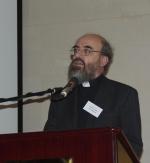 The Revd Patrick Comerford (Dublin) urged the Synod to vote against the Bill. He told the House that, while the Bill is in the name of Standing Committee, it does not have the support of the majority of members of the Standing Committee. Referring to the proposed figures as outlined in the Bill, Mr Comerford said that 26% of clergy in Dublin in sector ministry, 10% of clergy in Meath and Kildare, and 11% in Limerick and Killaloe, all in sector ministry, would not be represented. According to the latest Census, the Church of Ireland is growing rapidly in the Republic, by 150% to 200% in some areas. Therefore, the Synod needs to be reformed “root and branch” so that it is gotten right for the next generation, he said.
The Revd Patrick Comerford (Dublin) urged the Synod to vote against the Bill. He told the House that, while the Bill is in the name of Standing Committee, it does not have the support of the majority of members of the Standing Committee. Referring to the proposed figures as outlined in the Bill, Mr Comerford said that 26% of clergy in Dublin in sector ministry, 10% of clergy in Meath and Kildare, and 11% in Limerick and Killaloe, all in sector ministry, would not be represented. According to the latest Census, the Church of Ireland is growing rapidly in the Republic, by 150% to 200% in some areas. Therefore, the Synod needs to be reformed “root and branch” so that it is gotten right for the next generation, he said.
Mr Wilfred Baker (Cork) said that the proposed system of representation based on the number of cures is not fair as it penalises those dioceses that have carried out rationalisation over the years, reducing their number of cures. It is a fact that Connor and Down & Dromore dioceses find it difficult to fill all their lay spaces and, if their representation were increased further, it would mean even more clergy would attend the Synod. Such a clerical preponderance would not be healthy, he said.
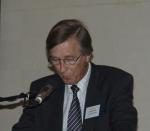 The Very Revd Leslie Forrest (Ferns) agreed with Wilfred Baker saying that there has been a 66% reduction in cures in the Republic and only a 20% reduction in Northern Ireland over the past 60 years. Dean Forrest urged that many other demographic factors should be taken into account when considering synodical reform.
The Very Revd Leslie Forrest (Ferns) agreed with Wilfred Baker saying that there has been a 66% reduction in cures in the Republic and only a 20% reduction in Northern Ireland over the past 60 years. Dean Forrest urged that many other demographic factors should be taken into account when considering synodical reform.
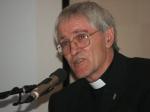 The Revd Canon Horace McKinley (Dublin) said he was worried about the shrinkage of representation in the Republic. This is not what being Church is all about, he told the Synod, particularly in this new, rapidly expanding, Ireland. To shrink representation would have a severe and negative impact on the voice of the Church across the whole island. “This Bill is contrary to what we are trying to be and achieve as a Church,” he said.
The Revd Canon Horace McKinley (Dublin) said he was worried about the shrinkage of representation in the Republic. This is not what being Church is all about, he told the Synod, particularly in this new, rapidly expanding, Ireland. To shrink representation would have a severe and negative impact on the voice of the Church across the whole island. “This Bill is contrary to what we are trying to be and achieve as a Church,” he said.
 The Revd Canon Dr Ian Ellis (Dromore) reminded the House that this reform doesn’t preclude other reforms going through. The Bill was not just a tinkering with numbers but a very serious look at an important issue. “The Church cannot afford a long standing unresolved issue,” Canon Ellis said. He also added that there is also a real fear among those from larger dioceses that they don’t have the same opportunities to take part in the governance of the Church as those in the smaller dioceses. “People do care,” he said. This Bill also provides the opportunity to model good practice in fairness.
The Revd Canon Dr Ian Ellis (Dromore) reminded the House that this reform doesn’t preclude other reforms going through. The Bill was not just a tinkering with numbers but a very serious look at an important issue. “The Church cannot afford a long standing unresolved issue,” Canon Ellis said. He also added that there is also a real fear among those from larger dioceses that they don’t have the same opportunities to take part in the governance of the Church as those in the smaller dioceses. “People do care,” he said. This Bill also provides the opportunity to model good practice in fairness.
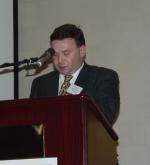 Revd Brian Kerr (Clogher) said that, although our current structures are based on cures, there are plenty of non-pariochial ministries on the Synod. Just because that is the model does not mean that only serving incumbents can serve on the General Synod. Each diocese can draw up its own rules as to how members are elected to Synod. Mr Kerr also reminded Synod that this Bill makes a provision for regular review which would take into account continually changing demographics.
Revd Brian Kerr (Clogher) said that, although our current structures are based on cures, there are plenty of non-pariochial ministries on the Synod. Just because that is the model does not mean that only serving incumbents can serve on the General Synod. Each diocese can draw up its own rules as to how members are elected to Synod. Mr Kerr also reminded Synod that this Bill makes a provision for regular review which would take into account continually changing demographics.
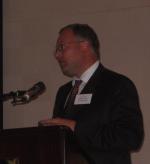 Mr Lyndon McCann (Dublin) urged the Synod to vote against the Bill. He pointed out that, while there currently exists a flawed system of representation, to replace this with another flawed system would be inappropriate.
Mr Lyndon McCann (Dublin) urged the Synod to vote against the Bill. He pointed out that, while there currently exists a flawed system of representation, to replace this with another flawed system would be inappropriate.
The Bill was rejected at its Second Reading.

